GOP official rails over effort aimed at nomination rules
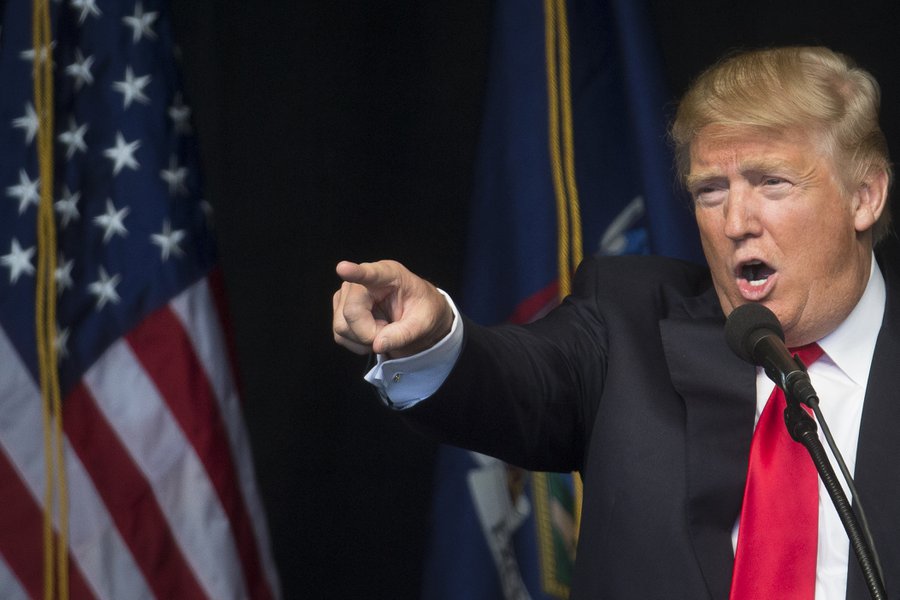
In an extraordinary display of internal discord, the chairman of the Republican Party’s rules committee accused top GOP officials Saturday of “a breach of our trust” by improperly trying to impede a proposed change in bylaws that would make it harder for party leaders to nominate a fresh candidate for president. Bruce Ash, RNC committeeman from Arizona, wrote the harshly worded email to the other 55 members of the GOP rules committee that he chairs. The confidential email, obtained by The Associated Press, was written days before party officials gather in Hollywood, Florida, for preliminary discussions about what rules the GOP will use at its presidential nominating convention this July. Ash wrote the note at a time when some top Republicans consider the party’s two leading presidential contenders, billionaire Donald Trump and Texas Sen. Ted Cruz, to be likely November election losers and have discussed how to replace them with alternatives at the summer convention in Cleveland, Ohio. It is possible that no contenders will have the 1,237 delegates needed to clinch the nomination at that gathering, which would produce the first GOP convention without a presumptive nominee since 1976. Trump has bitterly clashed with party leaders over rules that he claims have been rigged against him, a charge party leaders deny. Ash said he has “become troubled” during discussions with RNC Chairman Reince Priebus and other party officials that by not making the proposed change, GOP officials “could use their power to attempt to achieve a political result” at the nominating convention. He said the convention’s presiding officer could use existing rules to “unilaterally reopen nominations to allow a candidate to be nominated that is viewed as more acceptable, which is exactly what so many rank-and-file Republicans across America fear.” His email did not mention that House Speaker Paul Ryan, R-Wis., is expected to be presiding officer for much of the convention. Some opponents of Trump and Cruz have suggested that Ryan, his party’s 2012 vice presidential candidate, would be a preferable presidential nominee this year, but Ryan has said he doesn’t want to be tabbed. In an email sent hours later, RNC chief counsel John Ryder said the controversial amendment would, in fact, be included among the items given priority consideration when party officials discuss convention rules this week in Florida. But echoing the view of Priebus and some other Republicans on the party’s rules committee, Ryder added, “Major changes now are dangerous and not a good idea, in my humble opinion.” Many Republican leaders have said party officials should not change current convention rules for fear of being accused by the competing presidential candidates of tilting the bylaws to influence the outcome. They have noted that the final decisions on the rules will be made anyway by the convention’s 2,472 delegates, probably on July 18, the gathering’s first day. When Republicans meet in Florida next week to discuss their rules, Oregon RNC committeeman Solomon Yue wants to propose not running full convention meetings under the rules of the House of Representatives, a long tradition. Instead, Yue wants to use Roberts Rules of Order. Yue and others say under the Roberts rules, it would be easier for the convention’s delegates to vote to block an effort by the convention’s presiding officer to consider new nominees for president. Under House rules, the presiding officer has more power to make decisions about the proceedings. Ash said RNC officials have repeatedly asked him and Yue to withdraw Yue’s proposal or even to cancel this week’s GOP rules committee meeting. Ash said he refused. He said that last Thursday, Ryder “convened a rules committee whip call to strategize against and led the opposition to the Yue amendment at the chairman’s request.” He said during that call, RNC officials acknowledged that Yue’s amendment had been “pre-submitted” by a deadline that would give it priority treatment his week. But the next afternoon, Ash said, the RNC sent an email “incorrectly stating” that Yue’s proposed amendment had not been submitted in time to be included in the agenda for next week’s meeting. That would deprive it of priority consideration. “In view of the above, I consider this to be a breach of our trust,” Ash wrote. He added, “In light of this breach and an apparent unwillingness to conduct a proper debate on the amendment, is it prudent for the RNC to continue to give the extraordinary power of the House rules to the presiding officer of the convention, as opposed to the more transparent, democratic and majoritarian rules in Roberts?” Ryder wrote that party officials thought they were following Yue’s desire to circulate his amendment to delegates early next week, even though Yue submitted his proposal in time for the earlier “pre-submission deadline.” “Of course, we wouldn’t have left out Mr. Yue’s amendment from the notice if we thought he wanted it included,” Ryder wrote. Republished with permission of the Associated Press.
Guest lineups for the Sunday news shows

Guest lineups for the Sunday TV news shows: ABC’s “This Week” — Not immediately available. ___ NBC’s “Meet the Press” — Democratic presidential candidate Bernie Sanders; Paul Manafort, convention manager for Republican presidential candidate Donald Trump; New York Mayor Bill de Blasio. ___ CBS’ “Face the Nation” — Sanders; Republican presidential candidate John Kasich. ___ CNN’s “State of the Union” — Sanders; Democratic presidential candidate Hillary Clinton. ___ “Fox News Sunday” — President Barack Obama. ___ Republished with permission of the Associated Press.
Donald Trump works to right campaign before Wisconsin votes

Donald Trump worked to right his campaign on Sunday after a shaky week, brushing off verbal missteps about abortion, nuclear weapons and GOP rival Ted Cruz as he cast forward to Tuesday’s Republican presidential primary in Wisconsin. Trump, acknowledging the possibility of a loss to Cruz in Wisconsin, said it would be better to win the state but was confident he would capture the nomination regardless. He acknowledged that the past few days had marked a difficult patch for his campaign. “I think I get there anyway” — meaning the nomination — Trump told “Fox News Sunday. The Republican race is overshadowed by a persistent effort by Trump’s rivals in the campaign and the party to force the nomination fight into the July convention. Amid talk of the Republican establishment trying to block the front-runner, GOP Chairman Reince Priebus said the nomination process will be clear, open and transparent. Cameras will be there “at every step of the way” at the convention, he said on ABC’s “This Week.” If the race isn’t settled after all the primary contests, then “we’re going to have a multi-ballot convention,” with more and more delegates free to pick a candidate of their choice in each round. But Priebus was clear: “Nothing can get stolen from anyone.” On the Democratic side, the race between Hillary Clinton and Bernie Sanders has grown increasingly bitter, too, though it has not matched the GOP contest for raw hostility. Their attention will quickly turn to an even more consequential contest, in New York on April 19, where Clinton hopes to avoid an upset in the state she served as senator. Clinton told NBC’s “Meet the Press” that she was confident the two campaigns could settle on a debate date before that primary. In recent days, Clinton has taken issue with Sanders’ suggestions that her campaign is being aided by fossil-fuel interests, and in the broadcast interview, she accused Sanders’ aides of doing insufficient research about her record of standing up to oil and gas companies. “We were not lying,” Sanders told CNN’s “State of the Union.” ”We were telling the truth.” Wisconsin has emerged as a proving ground for anti-Trump forces as the front-runner’s campaign hit a rough patch. Cruz has little chance to overtake Trump in the delegate hunt before the convention. Ohio Gov. Kasich has none. Both hope to deny Trump a delegate majority in what’s left of the primary season, forcing the nomination to be settled at a contested convention at which one of them might emerge. Kasich expressed confidence that Republicans would have an “open convention,” but suggested it wouldn’t involve the type of unseemly chaos that party leaders fear will play out on national television, dampening their prospects for winning the presidency and possibly House and Senate races, too. Kasich told ABC that a contested convention will be “so much fun.” “Kids will spend less time focusing on Bieber and Kardashian and more time focusing on how we elect presidents,” Kasich said. “It will be so cool.” Republished with permission of the Associated Press.
Guest lineups for the Sunday news shows
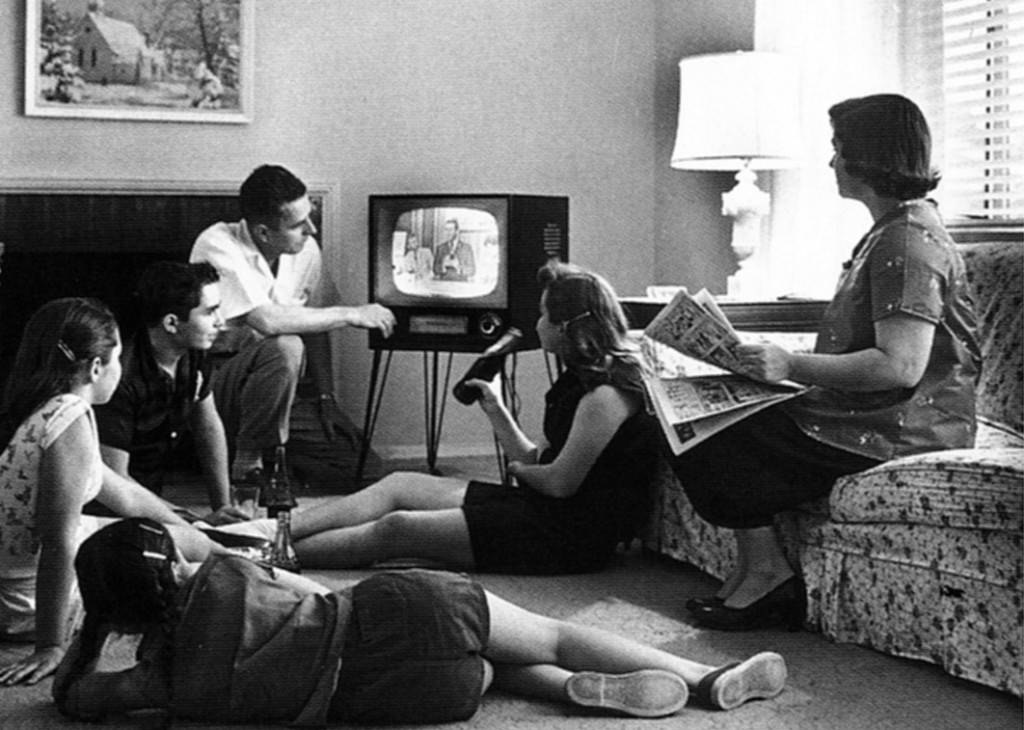
Guest lineups for the Sunday TV news shows: ABC’s “This Week” — Democratic presidential candidate Bernie Sanders; Republican presidential candidate John Kasich; Republican National Committee Chairman Reince Priebus. ___ NBC’s “Meet the Press” — Sen. Ron Johnson, R-Wis.; Priebus. ___ CBS’ “Face the Nation” — Republican presidential candidate Donald Trump; Priebus. ___ CNN’s “State of the Union” — Sanders, Priebus. ___ “Fox News Sunday” — Trump, Priebus. ___ Republished with permission of the Associated Press.
Wisconsin-based ‘Cheesehead Revolution’ challenged by Donald Trump

A trio of Wisconsin Republicans looking to inject the party with their own youthful, aggressive brand of conservatism ushered in the “Cheesehead Revolution.” Their aim was to position the GOP for success in the 2016 presidential election. Then came Donald Trump. With the anti-Trump movement in full swing even as Trump solidifies his front-runner status in the presidential race, the focus turns to the April 5 primary in the home state of those three heavyweights: House Speaker Paul Ryan, Republican National Committee Chairman Reince Priebus and Gov. Scott Walker. They are trying to chart a course in the face of a revolt over Trump’s rise and what it means for the future of the Republican Party — and for each of them individually. “The great plans came off the tracks with the presence of Donald Trump, both in terms of where the party would be and presidential ambitions,” said Democratic Milwaukee Mayor Tom Barrett, who ran against Walker twice and lost both times. “Donald Trump changed everything.” The “Cheesehead Revolution,” as Walker and Priebus dubbed it, began in 2011. With Ryan rising in the House, Walker a new governor, and Priebus taking over the party apparatus, the trio then represented what looked to be a unified party in a swing state that could become a GOP stronghold in presidential races to come. But in 2012, Mitt Romney lost to incumbent Barack Obama, with Ryan as his running mate. Priebus tried to steer the party in a more inclusive direction. In 2013, he issued the “Growth and Opportunity Project,” aimed toward an immigration overhaul and outreach to minorities, and driven by the recognition that Hispanics in particular were rising as a proportion of the population. Now that tract is known as an autopsy report. The recommendations put Priebus at odds with more conservative Republicans. And now, two of the three remaining presidential candidates, Trump and Texas Sen. Ted Cruz, have built their campaigns not on trying to broaden the party by reaching out to Hispanics and minorities, but by appealing to evangelicals and more conservative white voters. Priebus’s report “has been haunting the Republican Party” ever since its release, said Steve King, an Iowa Republican congressman who backs Cruz. “It’s awfully hard to recover from something like that,” King said. Trump launched his campaign by calling Mexican immigrants rapists and criminals. He’s made a border wall a cornerstone of his platform. Those positions have torn at the party’s core, contributing to efforts to stop him. Priebus puts the best face on the chaotic campaign. He says his party is large enough to handle a variety of opinions about the best course. He cites record fundraising and voter turnout. He calls it a “miracle turnaround.” Ryan became House speaker in October, replacing John Boehner, and his stock has risen to a point that some Republicans see him as an alternative to Trump if the nomination isn’t settled going into the summer convention. “Paul Ryan has brought about climate change there,” said King, meaning the climate in Congress, “and I mean that in a very complimentary way.” King is one of the most conservative members of Congress and was a critic of Boehner. Just as he refused initial calls to run for speaker, Ryan has tried to tamp down talk of being drafted as an alternative to Trump at the convention. Robin Vos, the Republican speaker of Wisconsin’s state Assembly, said Trump’s rise has helped to put the Republican Party at a crossroads. But Vos said he still believes Walker, Ryan and Priebus are in positions to “change the face of government.” Vos pointed to Walker’s record as governor as proof that with a “good, articulate leader,” Republicans can advance their conservative agenda, even in a politically divided state like Wisconsin. Vos endorsed Cruz on Friday. But Walker has been struggling with public support since his failed presidential run. His call in September for other Republican candidates to join him and drop out of the race to make it easier for others to take on Trump went ignored for months. Walker still hasn’t endorsed anyone in the race, with Wisconsin’s primary just over a week away. He told AP he sees Trump’s popularity as an “an anomaly” that is overshadowed in significance by Republican success in governor’s races and state legislative contests for years. “You look over the last five, six years, the story that’s had the longer impact is not who the nominee is for one presidential election but this shift that’s happened nationally,” Walker said. Barrett, the Milwaukee mayor who lost to Walker in 2010 and 2012, said the political landscape has changed for Walker and Republicans since the governor won a recall election four years ago over his battle with public-service unions in the states. “A lot of the glitter’s gone,” he said. Republished with permission of the Associated Press.
Hillary Clinton emails: GOP sues, senators press attorney general
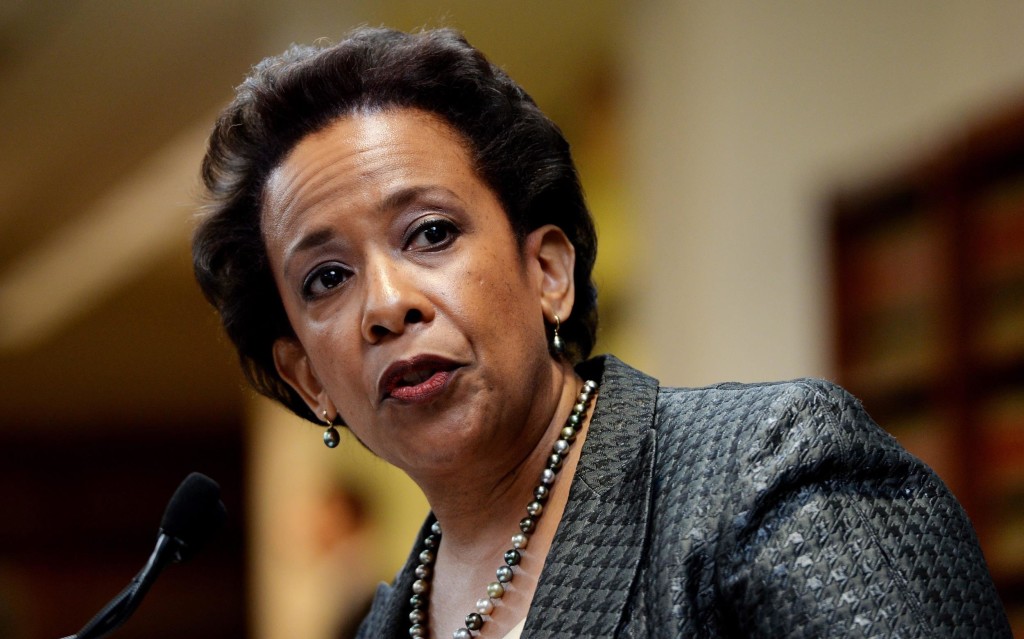
Republican senators pressed for more information Wednesday about an FBI investigation into the potential mishandling of sensitive information that passed through former Secretary of State Hillary Clinton‘s private email server, and their party sued for copies of the messages. The Republican National Committee filed two lawsuits in U.S. District Court in Washington over access to electronic messages sent or received by the Democratic presidential candidate and her top aides during her time as the nation’s top diplomat. Both spring from Freedom of Information Act requests filed last year seeking copies of emails and text messages. In court filings, the GOP says it has not received any documents in response to the requests. The GOP litigation brings the total to at least 34 civil suits so far involving requests for federal records related to Clinton’s service as secretary of state between 2009 and 2013. The Associated Press is among those with a pending case at the Washington courthouse. “For too long the State Department has undermined the public and the media’s legitimate right to records under the Freedom of Information Act, and it’s time it complies with the law,” said RNC Chairman Reince Priebus. The State Department has released more than 52,000 pages of Clinton’s work-related emails, but her private lawyers have withheld thousands more that they deemed to be personal communications unrelated to her job. Also left unresolved are questions about how Clinton and her closest aides handled classified information. The AP last year discovered Clinton’s use of the private email server, which had been set up in the basement of Clinton’s New York home by former State Department staffer Bryan Pagliano, for her to use exclusively for her work-related emails while she was secretary. The FBI for months has investigated whether sensitive information that flowed through Clinton’s email server was mishandled. The State Department has acknowledged that some emails included classified information, including at the top-secret level. Clinton has said she never sent or received anything that was marked classified at the time. The inspectors general at the State Department and for U.S. intelligence agencies are separately investigating whether rules or laws were broken. Members of the Senate Judiciary Committee questioned Attorney General Loretta Lynch on Wednesday about media reports that the Justice Department had offered Pagliano immunity from criminal prosecution in exchange for his cooperation. Pagliano previously declined to testify before Congress, citing his Fifth Amendment rights against self-incrimination. Sen. Chuck Grassley, the committee chairman, asked Lynch whether Pagliano’s immunity offer carried over to congressional committees. Grassley, R-Iowa, wants to recall Pagliano to testify if he has received immunity. Lynch declined to answer the question. “We don’t go into details with the agreements that we have with any witness on any matter in ongoing investigations,” the attorney general said. “The consistency with which the department handles ongoing matters, whether they involve a famous last name (or not), is something that we take very seriously,” Lynch said. “We treat them the same, and that is how the public takes confidence in the investigations we conduct.” Lynch also said she had not discussed the email investigation with anyone at the White House and did not plan to do so. Republished with permission of the Associated Press.
‘Tis the season for dreams of brokered political convention

‘Tis the season — no, not THAT season. It’s that point in the presidential election cycle when speculation starts swirling that the primaries won’t produce a clear winner and one of the parties’ big nominating conventions will dissolve in chaos. This time, it’s the Republican side of the race that’s looking particularly unsettled. After a crazy year in which Donald Trump‘s ability to stay on top in a supersized pack has repeatedly confounded the conventional wisdom, the what-if chatter is wilder and louder than usual. What if no one gets a majority of delegates in the primaries and caucuses? What if Trump leads the delegate count but party elites want to derail his route to the nomination? What if delegates to the Cleveland convention deadlock on multiple votes and then try to turn to someone completely new, perhaps House Speaker Paul Ryan?!? Ridiculous, says Ryan. Silly, says Republican Party Chairman Reince Priebus. “I don’t think that’s going to happen,” says Trump. Veteran politicos agree such scenarios are unlikely. The outlook will clarify once people start voting in February, they insist. But they also acknowledge that the chances of an unsettled outcome are higher than usual in the current unconventional political environment. Ben Ginsberg, the lawyer who was counsel for the Mitt Romney and George W. Bush presidential campaigns, says that because this GOP election cycle offers three lanes of candidates instead of two — a “Trump” lane in addition to the traditional “establishment” and “conservative” lanes — “it becomes more likely that no one will have a majority of delegates.” “The odds are still really small,” Ginsberg continues, then offers this caveat: “I did say on the day before the 2000 election that there would never be another presidential recount.” This from the man who went on to play a central role in the Florida recount at the heart of the Bush v. Gore battle for the presidency. The large field of GOP candidates and Trump’s wildcard candidacy aren’t the only factors at play in speculation that the 2016 primaries could end in uncertainty. The GOP in recent years has been shifting to a more proportional way of allocating delegates from each state than the old winner-take-all approach. And that means the momentum Romney achieved after winning a couple of big states in 2012 “is just not going to be as likely” this time, says Mark Stephenson, a Republican consultant who handled delegate strategy for Scott Walker‘s short-lived presidential campaign and worked on the Romney campaign in 2008. Even if the field of candidates has been winnowed to three or four after the first four states award 130 delegates in February, the winner in the big Super Tuesday round of voting on March 1 still might come up with just 300-400 delegates of the 600-plus to be awarded that day, says Stephenson. That’s a far cry from the 1,237 delegates needed to clinch the nomination. Stephenson agrees that a contested convention is unlikely, but says that between the unusual campaign dynamics at play this year and the proportional delegate allocation rules, “as people start playing with the math, it’s certainly an interesting exercise to come up with scenarios” under which nobody gets to a majority before the convention. This, then, is the time of joy for delegate geeks who love to nerd out on the fine print of presidential politics and speculate on the what-ifs of a divided convention. “We do this every four years,” says Joshua Putnam, a political science lecturer at the University of Georgia whose frontloading.blogspot.com wallows in the intricacies of the primaries. “We want it to happen just for the sheer excitement of it all,” Putnam says of a contested convention. “But the chances of it happening are pretty slim.” The idea of a brokered convention harks way back to when power brokers in smoke-filled rooms could twist arms and party bosses could steer their preferred candidate toward the nomination. More likely these days, if still a longshot, is a contested or deadlocked convention that opens without a presumptive nominee. The last time a Republican convention opened without a clear nominee was 1976, when Gerald Ford led in delegates but lacked a majority coming into the convention. There was plenty of drama as Ford beat back a challenge from Ronald Reagan and eked out the nomination on the first vote. You have to go all the way back to 1952 for a true brokered convention at which delegates turned to someone new. Democrats drafted Adlai Stevenson, who won on the third ballot. Putnam says a rule approved at the GOP convention in Tampa in 2012 could add intrigue in 2016. It requires a candidate to have a majority of delegates in eight states to win the nomination, up from the previous requirement of a plurality of delegates in five states. In a large field, this higher hurdle to the nomination could be daunting. But it’s also a temporary rule that the party can change if the outlook is muddled coming out of the last round of primaries in June. Talk that party elites might try to derail a Trump presidency at the convention runs into all sorts of pushback against the idea of disregarding the will of GOP voters. “I’m an ANTI-Trump guy, but if the GOP elites (of whom I might be one) attempt to smother the will of Republican primary voters, I will spring to Trump’s defense,” GOP consultant Rich Galen said in an email. As for the Paul Ryan scenario, the House speaker declares it “dumb speculation” that should stop. Of course, it was just two months ago that Ryan was pooh-poohing pleas that he become speaker after John Boehner resigned. Republished with permission of the Associated Press.
GOP candidate Ben Carson threatens to leave Republican Party

In what would be a nightmare scenario for the GOP, presidential candidate Ben Carson threatened Friday to leave the Republican Party amid reports of deepening concerns from GOP officials about the splintered 2016 electorate. The retired neurosurgeon lashed out at Republican leaders who discussed the possibility of a “brokered convention” during a recent private dinner in Washington. The Washington Post first reported Thursday that the group, including Republican National Committee chairman Reince Priebus and Senate Majority Leader Mitch McConnell, addressed the sustained strength of billionaire businessman Donald Trump and the possibility that a consensus nominee might not emerge before the party’s mid-July national convention in Cleveland. “If this was the beginning of a plan to subvert the will of the voters and replace it with the will of the political elite, I assure you Donald Trump will not be the only one leaving the party,” Carson said in a statement that referenced Trump’s repeated threats to leave the GOP if treated “unfairly.” “I pray that the report in the Post this morning was incorrect,” Carson added. “If it is correct, every voter who is standing for change must know they are being betrayed. I won’t stand for it.” Republished with permission of the Associated Press.
Rivals unmoved by Ben Carson’s complaints on scrutiny of his bio
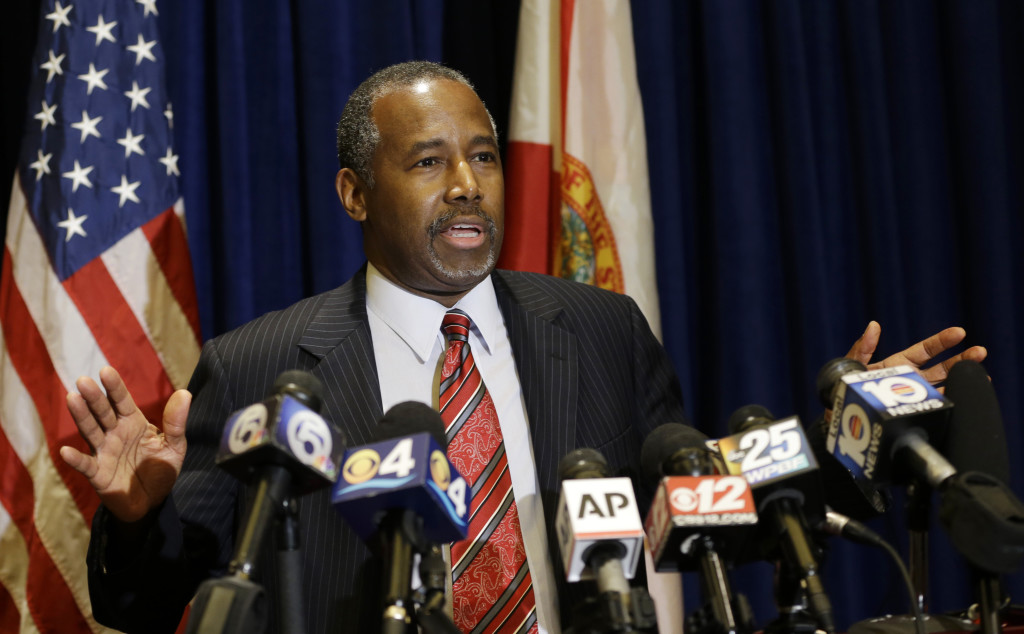
Ben Carson says it’s time to move on from questions about the accuracy of his life story. But Tuesday’s Republican debate makes that unlikely, and some of his GOP rivals say such scrutiny is part of running for president. The retired neurosurgeon said Sunday that questions about discrepancies in his autobiography are distractions from “much more important” matters facing the country and that he’d discuss any “real” scandal uncovered about his past. He strongly disputed any dishonesty or wrongdoing. “Every single day, every other day or every week, you know, they’re going to come out with, ‘Well, you said this when you were 13,’ ” Carson said on CBS’ “Face the Nation” Sunday. “The whole point is to distract the populace, to distract me,” he added. Carson got no sympathy Monday from a pair of Republicans who are trailing him in the presidential polls and said they had endured years of personal scrutiny as governors. “We’re responsible for the personal stories we tell about our lives and we need to be asked about them,” New Jersey Gov. [Chris] Christie said about Carson on MSNBC’s “Morning Joe.” Mike Huckabee, a former Arkansas governor, said when he heard Carson’s complaints about the media, “I’m thinking pal, you ain’t seen nothing yet.” “You know that if you run for office you’re going to be put through the sausage grinder,” Huckabee told MSNBC. Moving on, at least in the short term, is unlikely for Carson. The accuracy of his autobiography has dominated his campaign in the past few days, and more questions are likely during Tuesday’s debate. The intensified questioning reflects Carson’s transformation from political outsider to the top of the polls in the unsettled nomination fight, second only to billionaire developer Donald Trump. And in early-voting Iowa, some polls show Carson leading. Trump tried Sunday to keep the allegations alive. On several news shows, he mentioned examples from Carson’s autobiography, “Gifted Hands,” about Carson’s bad temper when he was young. Carson claimed that he tried to hit his mother with a hammer and unsuccessfully tried to stab someone. Several times, Trump quoted Carson as describing his younger self as having a “pathological” temper — and then demurred on his own opinion of Carson’s character and veracity. “I just don’t know. I mean, I’m not involved. I don’t really know,” Trump said on CNN’s “State of the Union.” Carson insists no other candidate has received the level of scrutiny that he has. Asked on NBC’s “Meet the Press” whether he is being scrutinized more than President Barack Obama and former President Bill Clinton, Carson replied: “Not like this. Not even close.” Republican Party chairman Reince Priebus criticized the intense questioning Monday, saying that while he considers candidate vetting by the media appropriate, “I do believe this is a totally, crazy obsession over incredible detail from 30 or 40 years ago.” “The fact is, you know, we wish the media would be just as obsessed with Hillary Clinton’s lies over the years,” Priebus said in an interview on NBC’s “Today” show. Scrutiny of one’s past is par for any major candidate for president. Obama’s citizenship was questioned, including by Trump, and the president later released a birth certificate showing he was born in Hawaii. Clinton’s marital dalliances were probed during the 1992 campaign. The Miami Herald staked out then-Sen. Gary Hart‘s townhouse in 1987 and caught him in an extramarital affair. Hillary Rodham Clinton, the front-runner for the Democratic presidential nomination, last month testified about the private email server she kept at her house and used for government business while she was secretary of state. Carson is a newcomer to presidential politics, so much about his life, career and published works are being raked over for the first time, and his longtime status as an American success story is being examined. Carson strongly disputed that there was any dishonesty intended. Gone Sunday was the anger he showed during a news conference on Friday, when the usually even-tempered Carson demanded that reporters explain why, in his opinion, Obama had not been subjected to the same level of scrutiny. “My job is to call you out when you’re unfair, and I’m going to continue to do that,” he said. “Gifted Hands” is central to much of the scrutiny. It tells the story of Carson’s rise from a childhood in inner-city Detroit to director of pediatric neurosurgery at Johns Hopkins Hospital in Baltimore. In it, he tells of trying to stab a close friend when he was a teenager. CNN reported it could not find friends or confidants to corroborate that story. Politico published a piece examining Carson’s claim of receiving a scholarship offer to attend the U.S. Military Academy at West Point. The Wall Street Journal said it could not confirm Carson’s anecdotes from his high school and college years. The academy does not offer scholarships, instead extending all expenses paid to students it admits. Carson never applied for admission. Last month, police in Baltimore said they didn’t have enough information to verify Carson’s account of being held at gunpoint at a fast-food restaurant there more than 30 years ago. In a GOP debate last month, Carson said it was “absolutely absurd” to say he had a formal relationship with the medical supplement company Mannatech. He is featured in the firm’s videos, including one from last year in which he credits its supplements with helping people restore a healthy diet. Republished with permission of the Associated Press.
GOP suspends partnership with NBC News for February debate
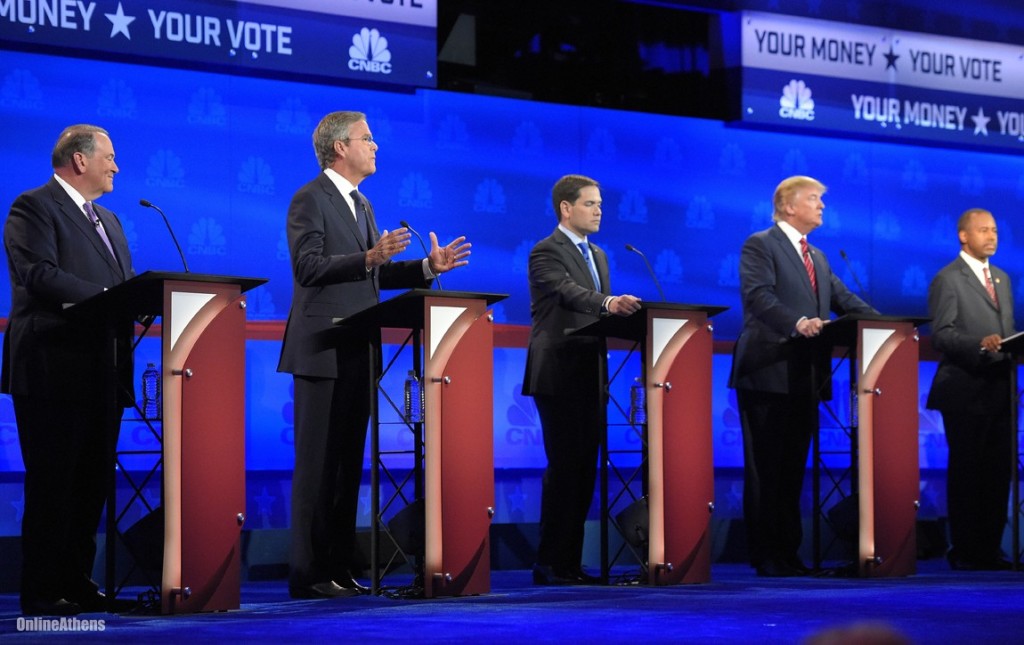
The Republican National Committee says it’s suspending its partnership with NBC News and its properties and won’t allow the network to co-host a presidential primary debate scheduled for February. The letter from RNC Chairman Reince Priebus to NBC News chief Andrew Lack comes after this week’s heavily criticized debate on CNBC. Priebus says the CNBC debate did not focus on economic issues as promised, and that candidates were asked questions that “were inaccurate or downright offensive.” NBC News, in a statement, called it a “disappointing development. However, along with our debate broadcast partners at Telemundo, we will work in good faith to resolve this matter with the Republican Party.” The RNC tells NBC it will still hold a debate as scheduled on Feb. 26 with its other planned media partner, National Review. Even before the decision to break with NBC, several of the GOP campaigns had planned to meet to discuss complaints about how the party’s debates are being run. Republished with permission of The Associated Press.
GOP debate takeaways: Marco Rubio-Jeb Bush rumble, Donald Trump largely quiet
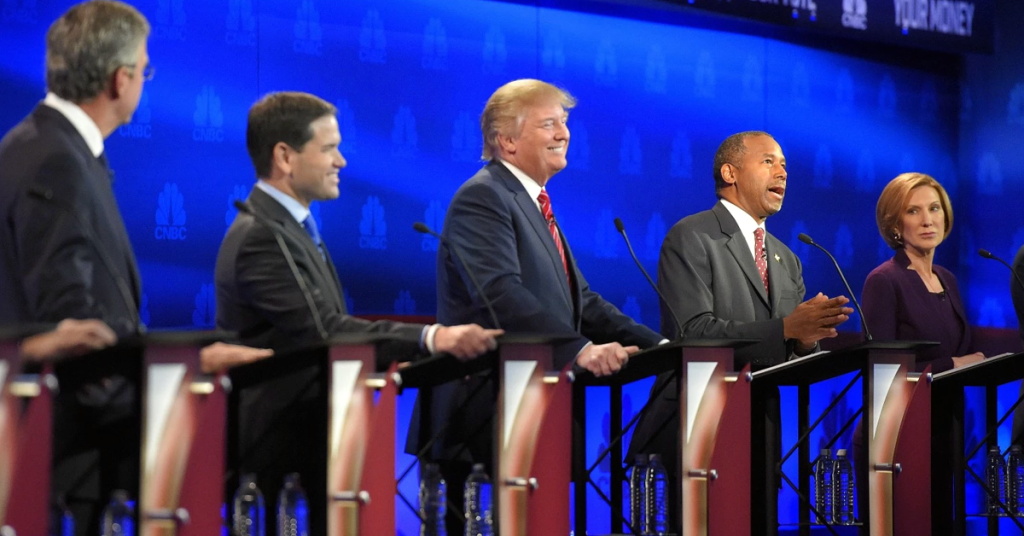
Celebrity businessman Donald Trump was again center stage as the Republican presidential field gathered Wednesday night for the third debate of the 2016 campaign, but for the first time, the billionaire seemed reduced to the role of a supporting cast member. An early rumble between former Florida Gov. Jeb Bush and Florida Sen. Marco Rubio showed they were willing to fight for the spotlight. Retired neurosurgeon Ben Carson, the leader in some recent preference polls, stuck to his soft-spoken style, while Texas Sen. Ted Cruz had some highlight moments – especially early on. Here are a few takeaways from the two-hour matchup in the swing-state of Colorado. — BUSH, RUBIO RUMBLE Simmering tension between Bush and Rubio, who are vying for the same traditional Republican donors and supporters, spilled into plain view just 15 minutes into the debate. Bush seemed prepared to go after Rubio for missing votes in the Senate, but appeared ill-prepared for Rubio’s quick response – that he’s only attacking him because he’s behind. “Marco, when you signed up for this, this was a six-year term and you should be showing up to work,” Bush said. “I mean, literally, the Senate. What is it, like a French work week? You get like three days where you have to show up? You can campaign, or just resign and let someone else take the job.” But Rubio was ready with his reply, citing the percentage of votes missed by previous senators who ran for president, including President Barack Obama. The detail of his response showed he had been prepared for the attack – and that he knows it could be viewed as a liability. “The only reason why you’re doing it now is because we’re running for the same position, and someone has convinced you that attacking me is going to help you,” Rubio said. — A QUIETER TRUMP With the moderators focusing more on Bush, Rubio and some others, Trump seemed unusually quiet. He was asked only a few questions by the moderators from CNBC and interjected himself into other questions far less than in the first debate, when he seemed in command of the debate stage. One of his longest responses was on his company’s bankruptcy record. His use of legal bankruptcy, he said, shows, “boy, am I good at solving debt problems.” As has been the case on each of the crowded debate stages, some candidates – including Kentucky Sen. Rand Paul and New Jersey Gov. Chris Christie – seemed to disappear for long stretches of time. That was also the case for former Arkansas Gov. Mike Huckabee, though he jokingly compared the bloated federal government to a runaway blimp making news Wednesday and later pointed out that he was wearing a Trump tie. — CRUZ PUSHES IN Cruz was a champion college debater and those skills were on display Wednesday. He deftly recapped the moderators’ quizzing of his opponents, describing those interactions as antagonistic. “These questions illustrate why the American people don’t trust the media. This is not a cage match,” he said. The rebuke drew some of the loudest, most sustained applause of the evening. Cruz said the Republican debate is a stark contrast with the Democratic contest, “where every fawning question” was about “which one of you is more handsome and wise?” Christie, Trump, Rubio and others joined in the media bashing. So, too, did Republican National Committee Chairman Reince Preibus, who told reporters the moment the debate ended that he was disappointed in both the debate’s moderators and CNBC. Cruz, a freshman Texas senator who has made his name by defying his fellow senators, also had one of the most memorable quips of the night. Asked by moderators to describe his worst characteristic, as he would in a job interview, he said with a smile: “I’m too agreeable, easy-going.” — CARSON QUIZZED During the August debate, Carson meekly said at one point, “I wasn’t sure I was going to get to talk again.” This time, as the leader in some recent preference polls, the moderators showed that people are taking a closer look at his background and his policy proposals. Carson said he’d like to have an across-the-board tax rate of 15 percent and get rid of all income tax deductions and loopholes if he were president. He also was questioned about his involvement with a medical supplement company called Mannatech that has come under legal scrutiny. Although he appears in promotions for the company, he called it “absurd” to say he has a relationship with them. When a moderator pushed him about whether perhaps that showed is weak on his “vetting process,” the crowd began to boo. Carson smiled – spotting his chance to pile-on the media as other candidates had done. “They know,” he said of the audience. — SICK OF IT ALL Asked about his biggest weakness with the first question of the debate, Kasich dismissed it and began a tirade about the seriousness – or lack thereof – in the Republican campaign. “We are on the verge, perhaps, of picking someone who cannot do this job,” he said ominously, noting – without using their names – Carson’s proposal to end Medicaid and Trump’s talk about deporting all immigrants who are in the country illegally. A few moments later, as Carson discussed his flat-tax proposal, Kasich piped back up: “This is the fantasy that I talked about in the beginning,” adding, “It’s not responsible.” “We cannot elect someone who doesn’t know how to do the job,” he said. Trump had a quick analysis of why Kasich’s tone had turned so negative: “His poll numbers tanked, and that’s why he’s on the end. And then he got nasty.” Republished with permission of The Associated Press.
Breaking Keystone silence, Hillary Clinton says she opposes pipeline

Whether it was by coincidence or not, Hillary Rodham Clinton picked a fortuitous time to announce that she opposes the Keystone XL pipeline. The longstanding criticism of Clinton’s reluctance to say where she stands on allowing the pipeline project to go forward was buried in the headlines by arrival of Pope Francis for his first visit to the United States. The next day, the pope’s call to action on climate change fit with Clinton’s reasons for opposing the pipeline. And it sets her up well for a few days of fundraising later this week in the San Francisco Bay area, where she was likely to face questions about her dithering among donors who are generally supportive of environmental causes. The Democratic presidential candidate said Tuesday that she had concluded the ongoing debate over whether the pipeline should be built had hindered a larger effort to curb global warming. “I think it is imperative that we look at the Keystone pipeline as what I believe it is – a distraction from the important work we have to do to combat climate change,” Clinton said in Des Moines, Iowa. “And unfortunately, from my perspective, one that interferes with our ability to move forward to deal with all the other issues. Therefore I oppose it.” Environmentalists have warned that the extraction and transport of oil risks setting back the fight against man-made climate change. Big business argues that the Canada-to-Gulf of Mexico project would create valuable jobs. On the presidential campaign trail, the debate over the pipeline has turned into a high-stakes fight for support and campaign cash as Clinton battles real and potential challenges. Opposing the pipeline puts her in line with rival Sen. Bernie Sanders, a favorite of the Democratic party’s left wing. Clinton’s opposition also sets out a marker as Vice President Joe Biden considers challenging her for the Democratic presidential nomination. Signs quickly surfaced that Clinton’s announcement was paying off for her. Tom Steyer, a California-based environmentalist and top Democratic donor, quickly credited Clinton for joining with “thousands of Americans calling on President Barack Obama to reject the Keystone XL pipeline in favor of building an American economy powered by clean energy.” On Wednesday morning, the pontiff joined Obama at the White House and made an urgent call to address climate change, warning it “can no longer be left to a future generation.” To be certain, Clinton’s unwillingness to offer a position had irritated liberals and environmentalists, and many winced when she said at a July town meeting in New Hampshire that if it was still undecided “when I become president, I will answer your question.” Clinton had said in 2010 that she was “inclined” to support the pipeline but had avoided taking a position after leaving the State Department in 2013. In recent weeks, Clinton expressed impatience over the Obama administration’s drawn-out deliberations and said last week in New Hampshire she was putting the White House “on notice” that she would soon announce her decision. Her campaign said the White House was briefed on Clinton’s position prior to her comments and she privately made her opposition known in discussions with labor officials in recent weeks. The announcement could set the boundaries for the environmental debate in next year’s presidential election. Republican candidates like former Florida Gov. Jeb Bush said on Twitter that Clinton’s decision proves she “favors environmental extremists over U.S. jobs.” Reince Priebus, the chairman of the Republican National Committee, meanwhile, said Clinton was being “blatantly dishonest” when she said her role at the State Department had prevented her from taking a position and said it was driven by concern about Biden joining the Democratic primary field. Clinton said in a posting on Medium on Wednesday that she would seek to modernize the U.S.’s energy infrastructure and develop new partnerships with Canada and Mexico to fight climate change in North America. She reiterated interest in creating an infrastructure bank to unleash investments in clean energy and said she would strengthen pipeline safety regulations and work to replace the country’s oldest pipes and riskiest train cars. “American energy policy is about more than a single pipeline to transport Canada’s dirtiest fuel across our country. It’s about building our future,” Clinton wrote. Republished with permission of the Associated Press.


